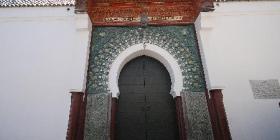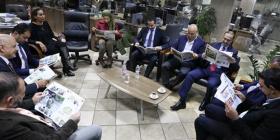Cairo: electronic diversity

by Paul Herincx
For some time, electro chaâbi or mahraganat from Cairo has been making the news. It is a more rhythmical version of the original chaâbi, created in the early XX century in the working-class neighbourhoods of Algiers. However, electronic music in Cairo goes much further than mahraganat. A whole constellation of young musicians is exploring the sound possibilities offered by computers and electronic devices.
They come from different backgrounds and their works cover a wide span of expression. Some of them are clearly inspired by a club type of energy, like Amr Alamy, a.k.a. 1127. Others borrow techno sound and incorporate it into more experimental contexts, such as Amr's project Cellar Door, or Ahmed El Ghazoly (Zuli) in solo or with Nader Ahmed (N/A\A) and their project XULI. Others, such as Muhammed Green (Gast.) or Bosaina develop ambient soundscapes.
Some artists work with acoustic instruments, like the guitar, and add electronic textures. Aya Metwalli oscillates between folk, pop and trip hop, whereas Youssef Abouzeid builds rock atmospheres in projects such as Shlomo Casio (with Zeina Aly) and PanSTARSS. In 2011, Zuli, Nader and Bosaina formed the musical collective Kairo is Koming (KIK) together with Ismael Hosny (ISMAEL), Hussein Sherbini and Nader. It's hard to classify their individual and common projects (Quit Together, Wetrobots, Beautiful Morning). The members of KIK explore hybrid paths, from techno to hip hop or R'n'B in a perspective of extremely contemporary digital aesthetics.
Youssef Abouzeid has just released Ghaby, Ghaby, Ghaby (Stupid, Stupid, Stupid), PanSTARRS's last alternative rock EP. With every new release, his music goes a step further, but voices and strings in the echo chamber continue to play a prominent role. “My love for music comes from a need to create. I started experimenting with music in different circumstances, and then I met people like Zuli, Nader and Asem. Our tastes are quite similar. It's a small scene, a niche. They initiated me to a different kind of music which I now love...”. In the Shlomo Casio project, he explores synthetic and electronic territories with Zeina Aly. “She's still learning to work with the equipment, so I do the whole production myself. I'm not a producer, it's a creative process that we work on together”. For Youssef, Shlomo Casio is a first step towards dance music, something he used to hate.
The concert and club culture is ever growing in Cairo. Many musicians have played for the first time in public in the 100 Live Electronic Festival, or in small downtown art spaces like 100 Copies Music Space, or the Townhouse/Rawabett theatre. These spaces have hosted musical discoveries and exchanges, but the artists complain about the venues' set-up: too small, with the public on steps or on couches. In order to solve the issue, Zuli and Asem imagined a space where different artists from the alternative scene – from established groups to unknown DJ's – could meet in a bar or on a dance floor. In November 2013, they opened VENT, halfway between a club and a concert hall. After having had some disputes with the owners of the building, they no longer manage a physical space but continue to organize VENT events in different places.
Asem, Zuli and Bosaina have collaborated with them for two years, working on public relations and communication for VENT. Their impressions about the scene are contrasting. Bosaina is sarcastic: “There is no scene!”. Zuli is explicit: “Something was happening, but the situation is stagnant. Things develop in Cairo, but it is a slow process. I think we'll see results in 10 years time”.
Since its creation, VENT has hosted many international artists: big names from the underground (Ben UFO, Huerco S.) and young foreign labels like Lobster Theremin, Rhythm Section or Danse Noire. For the trio behind VENT, this international showcase is necessary for the development of the music scene and works two ways: it brings to Cairo musical genres inexistent or rare in Egypt, and presents Egyptian music to the rest of the world through the invited international artists.
Often, foreign artists who would like to play at VENT contact them through musicians who have already been there. Bosaina adds that email requests have increased after the publication of an article about them on Resident Advisor, a leading website for electronic music. The scene gains visibility and the doors to the international circuit are progressively opening. After having been selected for the Red Bull Music Academy in 2014, Bosaina played in the last Sonàr Festival in Barcelona with Ismail and Hussein and their group Wetrobots. VENT also regularly organizes evenings in London clubs with the help of local contacts.
On the local scene, Zuli and Asem have invited about forty artists from Cairo. For this new generation of musicians, it is their first chance to play in a professional context and get paid for it, which is a rare thing in Cairo, with the exception of trusted promoters such as Mahmoud Refaat, owner of the 100 Copies alternative label, essentially dedicated to mahraganat via the ReTune Music label. “Concert halls such as Balcon Lounge and the Cairo Jazz Club look at our program and invite the same artists. And that's great, that's why we started VENT”, says Zuli.
When they still had their own space, weekday concerts were free and weekend concerts, starting Thursdays, cost between 100 and 200 Egyptian Pounds (12-24 €), similar to a ticket to local festivals such as the Downtown Contemporary Art Festival (now merged with the 100 Copies Electronic Festival) and emerging festivals in the desert such as Cloud9 and Oshtoora. These prices, however, are not accessible to most Egyptians (average income is around 1 200 EGP, or 141 €).
Aya Metwalli has one of the most beautiful voices in Cairo. She started as a solo artist, singing and composing melancholic and meditative ballads on her guitar. After taking a production class at Epic 101 Studios a few years ago, she started integrating more electronic sounds to her music. As many of her fellow musicians, she built her own culture surfing on the internet. Amr Alamy says: “It's a great and perfect tool when it is used well...... I grew up in the United Arab Emirates and I later moved to Egypt. Being able to hear different music from different places online is an eye-opener, a window on equality”.
Amr, a.k.a. 1127, produces futuristic club tracks, with rhythm and and elastic groove close to the Baltimore and British dance music sounds. “There's something, a feeling, even though I've never actually been to England, to the clubs and the raves there. But I suppose you can pick it up, you can grasp the spirit on the internet”. Internet is also the main platform on which he shares his music with the public. 1127's last EP came out on Half Death, a digital label working with artists from all over the world.
Muhammed Green, aka Gast., produces melodic ambient music. At times, as on his recent track Dot, the base line and pulsations are hypnotic. As most of his fellow musicians, Muhammed's tracks are published on his own Soundcloud account, through which he was contacted by Anywave and Junkie Slang, respectively based in Paris and Barcelona. These two labels pay close attention to the Cairo scene: Anywave published an EP by PanSTARSS, and Junkie Slang published one by Aya Metwalli. Through Junkie Slang, Muhammed and Aya's music is sold on platforms such as iTunes or Juno, but that is not enough for them to have sufficient income to live on.
According to Amr: “It becomes risky when you start thinking a of it as a business. Not only in Egypt, but particularly so here. If you're not a pop musician, you cannot make a living selling sounds. Nowadays, it's very hard to live only on live performances. That's where labels, blogs and media come in. And in Egypt, even with all those means, it would still be hard to make a living”.
In Cairo, Cairo Scene and Mada Masr are the two information websites that cover the electronic and alternative scene. The first often reviews new releases while the second discusses the situation of certain aspects of the scene's mechanisms. On a local level, the website Dandin (based in Egypt) offers an interesting concept. This Arab language platform, where users can upload and share audio files, promotes the exchange of artistic material from the Middle East. The young label Nawa Recording, based in London and Beirut also promotes alternative music from the Arab world.
Hussein Sherbini, member of KIK, has a theory on the circulation of music between East and West. Last spring, Hussein released a rap album entitled Electro Chaâbi, on which he condemns the exaggerated enthusiasm and cultural cliché peddled by some Europeans when promoting mahraganat. “I actually truly appreciate the organic movement of mahraganat, it really deserves a lot of attention. I just find it unfair that many Middle Eastern musicians don't have the same chance because their sound is more similar to Western sounds. I think more attention should be drawn to other trends that are developing in this area”.
Content produced in collaboration with Babelmed







